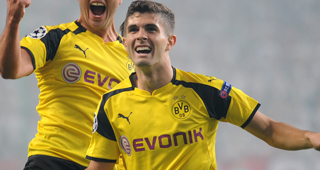It’s a strange distinction, the selling club, because basically everyone is. Chelsea, United, City, Barcelona, Madrid, PSG, Bayern, and (maybe) Juve. That’s the entire list of non-sellers. Certainly, there are various echelons of selling clubs. Liverpool are less likely to let their players go than Celta Vigo, but for the right price, the whole squad is available. Each summer, you can catch fans of the soccer bourgeoisie denying that this is true. They don’t want to root for a club that don’t have at least an outside shot at winning stuff, but they also don’t want to root for a behemoth. At same time, it’s a bummer to think the stars you like so much are only stopping by for a few years before leaving for said behemoths. So the defensive refrains go up when transfer rumors abound: tell those wealthy vultures to buzz off; we are not selling club. Lies can be liberating, if only temporarily.
It’s uniquely admirable, then, that Dortmund own the fact that, more often than not, they lose at least one spectacular talent over the offseason. Accepting your fate is not the same thing as being content—those sales directly to Bayern Munich have to smart even if they’ve become habitual by now—but since staring down financial oblivion in the mid-2000s, Dortmund have committed themselves to sustainability, and that means trying to balance squad continuity with selling players at a profit.
So when stars feel it’s time to move on, they usually do. Nuri Şahin goes to Madrid, Mario Götze and Mats Hummels to Bayern, Henrikh Mkhitaryan and Shinji Kagawa to United, İlkay Gündoğan to City. Ousmane Dembélé will be next, probably to Barcelona. It’s telling that the guys who don’t work out at the massive clubs tend to return. (Götze, Kagawa, and Şahin have all circled back.) Dortmund are an exceedingly competent club who favor attractive soccer and their supporters fill the Signal Iduna Park for every match. It’s a great place to play, the only drawback being that wages aren’t astronomical and Dortmund merely occasionally trouble Bayern in the Bundesliga or make deep Champions League runs. They compete as well as they can, with the resources available.
And this feels a little like gushing over a well-lettered grocery list, but in European soccer, hardly anyone ever seems to know what they’re doing. Transfers go through only after weeks of—I know it’s probably just middle-aged men in suits talking on the phone or over dinner, but I always imagine them engaging in Dr. Strangelove-style pie fights. This summer has been especially wild. Neymar to PSG went from obviously ridiculous rumor to inevitability in the space of two weeks stretched out into Tarkovsky time due to all the headlines and innuendo and twists. United were going to sign Álvaro Morata, couldn’t strike a deal with Real Madrid, then bought Chelsea target Romelu Lukaku in the middle of the night and Morata ended up at Chelsea. (The Spaniard had to shave his hair after the United move fell through because he had dyed some of it red.) Diego Costa is currently in Brazil, racking up fines and saying Chelsea have treated him like a criminal as he waits for Atlético Madrid to rescue him. Kylian Mbappé completes a move to both PSG and Madrid twice daily. Transfer inflation is through the roof. You could sell a Sunday leaguer in a Monaco shirt for $15 million these days.
This market has even infected Dortmund. They’ve suspended Dembélé for skipping out on training and generally being a brat in trying to force a move to Barça. But both the player and club will come out the other side of this. Dembélé will be convinced to stick around for one more season or sold off for something like $170 million, which Dortmund will then sink into their youth academy and reasonably priced twenty-five-year-olds who will perform better than you’d expect and teens from Lille and Standard Liege who will be groomed into Manchester City targets a few years from now. They’ve got this thing down to an extent no other club of their means does.
Maybe there’s a lesson here about accepting who you are allowing you to be the best version of yourself, but more practically, it’s simply pleasing to see prudence and smarts rewarded in a sport dominated by ham-fisted Globochems and littered with burnt-out nouveau riche projects and once-great powers who spent themselves to into the ground. Steady near-greatness isn’t thrilling, but neither is being able to pay the rent until you can’t anymore.
And Dortmund enjoy a special kind of transcendence when they are great, which is every so often. It’s the feeling of doing everything right and cause and effect coming through for you, as opposed to achieving glory because you were born rich. They don’t run from the selling club distinction because that’s what they are and what they need to overcome on a yearly basis. When they win, they win with one arm behind their backs. Which is something Bayern and Chelsea won’t ever do.
More 'End-To-End Stuff': Paris Saint-Germain, Chelsea, Manchester City, Tottenham Hotspur, Manchester United, Atletico Madrid, Barcelona, Real Madrid, Bayern Munich



